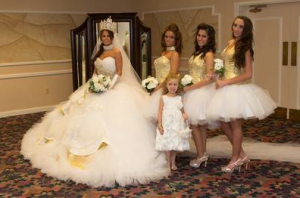Where do we draw the line as to culturally acceptable and unacceptable behavior?
 My sister has been watching My Big Fat American Gypsy Wedding on Netflix. She was describing to me an American subculture that few of us even know about, let alone think about. As she described it, I felt as if she was describing an acid-colored version of a Regency romance set in early 19th century England.
My sister has been watching My Big Fat American Gypsy Wedding on Netflix. She was describing to me an American subculture that few of us even know about, let alone think about. As she described it, I felt as if she was describing an acid-colored version of a Regency romance set in early 19th century England.
According to my sister, the gypsies marry when they the girls are quite young (with the girls’ age at the time of the wedding hovering around 15). Although social occasions such as dances are commonplace, girls and boys are never allowed to be together unchaperoned and it’s entirely possible for a girl to reach the altar without even having kissed her future husband.
The girls must be virgins when they marry, even though my sister says that they dress exactly like hookers during the courting phase. The boys are expected to get sexual experience with non-gypsy girls.
This social structure considers housewifely virtues the highest calling for a girl, so they are taken out of school when they’re still very young. They then settle down to a life of housekeeping and baby-making. Meanwhile, the men, who are also usually high school drop-outs make their living in itinerant trades. A profitable one is, apparently, selling paving services door to door. Working hard, they can make as much as $10,000 a week — which is a good thing because the gypsy culture is very image oriented. A wedding dress 6 feet across covered with crystals is commonplace.
As my sister was regaling me with this information, she said that she felt terribly sorry for the girls, because they had to cut short their education and are consigned to a life of domestic drudgery. I understood what she meant, but I said “That’s their culture. They don’t consider it a waste to be a somewhat educated homemaker.”
And with those words, I crashed right into cultural relativism. If I think my culture is the best — with girls having the same academic and professional opportunities as men — why am I willing to let these American gypsy girls get herded into marital servitude? And if that’s something I’m good with, why does it bug me when Muslim families swath their daughters in burqas? The first I greet with a resigned shrug; the second with a frisson of fear and distaste.
I was struggling to figure out where the lines exist for me, and came up with two principles. First, it depends if a moral absolute is concerned. When 19th century Indian wives were forced by culture to climb upon their husbands’ funeral pyres, that was culturally sanctioned murder. Lord William Bentinck was correct to end it on his watch. A moral country cannot allow its female citizens to be murdered — something that makes honor killings beyond the pale too. Taking a girl out of school to get married may be a waste of a good mind or promising talent, but education is not a moral imperative; it’s a cultural luxury.
Second, I’m more upset about differing cultures if I feel they pose a risk to me. Unlike the gypsies, who keep themselves to themselves, my feeling when I see a Muslim man with his burqa-clad wife or daughter is that he’s eying me and my daughter as future burqa wearers. While mine may be a tolerant culture, his is a conquering one, and there’s no doubt that he and his co-religionists think the world would be a better place if women and girls came neatly packaged in burlap.
Are there bright lines here that I’m missing or more nuanced arguments I could/should be making? Please let me know.
